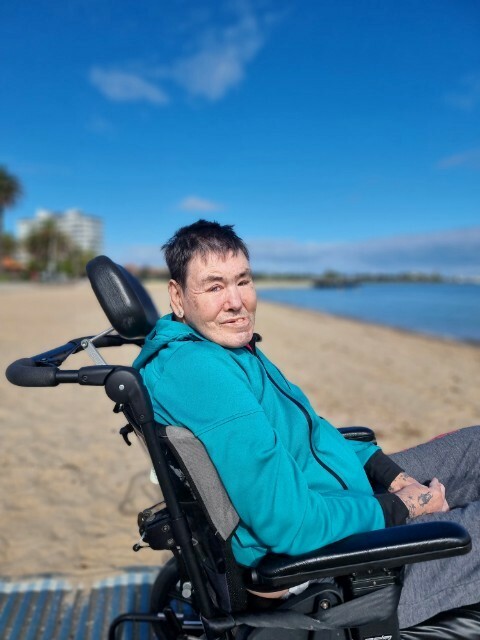“I feel like I'm very lucky”: Chris finds a home and support after two years in hospital
After a serious brain injury in 2020, Chris was in hospital for two years. The trauma and isolation left him feeling anxious and uncertain. The injury also meant Chris could no longer do everyday things like eat, shower, or walk.
Chris has found renewed peace and purpose at Ford Street Community House – a welcoming home providing individual care for people with disabilities run by Healthscope Independence Services (HIS). Here, he has made friends and received support to work on his goals.
“I have my own bedroom and my own things,” says Chris, who moved into Ford Street in 2022. “I used to be a bit anxious but that’s calmed down a fair bit because I feel comfortable and safe here.”
House supervisor Ruby, who has worked with Chris since he arrived at Ford Street, explains how HIS staff support him with daily tasks like showering, dressing and eating. And Chris is becoming increasingly independent. “He's starting to shave himself, choose his clothes, and talk more often about his likes and dislikes,” Ruby says.
Community and coffee
One of Chris’s first goals was to get back into the community. Three times a week, HIS staff support him to do this. “I like to go to St Kilda Beach,” Chris says. “And to the shopping centre. I like to have a coffee or have lunch.”
Just a few months ago, Chris couldn’t enjoy these simple pleasures. The brain injury caused difficulties with swallowing, so Chris received all his nutrition through a tube. Therapy with a speech-language pathologist and with support from HIS staff he has been able to drink fluids and feed himself.
“I’ve still got the tube, but I hardly use it,” Chris says. Ruby explains he can eat solid foods and drink water, cordial and coffee. “Chris has gained weight. His speech pathologist is so happy,” she says. “Chris’s next goal is to have his feeding tube removed which may be in the next two to three months.”
Wheels and walking
Another of Chris’s goals was to get more mobile. “In the hospital, Chris only sat in the wheelchair for an hour or two each day and spent the rest of the time in bed,” Ruby explains. “Now he chooses to spend more time in the wheelchair – maybe five to six hours.”
Chris recently got approval for a motorised wheelchair which, once it arrives, will give him further independence. “I’ll be able to go around the block and down to the park,” says Chris. He is also relearning how to walk, doing weekly physiotherapy and an exercise program. “I do standing and walking practice every day with the support staff,” he says.
Ruby, who has been with HIS since 2012, says supporting people to reach their goals is very rewarding. “It’s incredible to see changes in the lives of people with disabilities. Every morning I wake up and think about how I'm going to help someone work towards something that’s important to them.” Chris says the staff have “really helped me to achieve my goals.”
Flowers and friendship
Chris also receives support to take part in meaningful activities, like suggesting which flowers to plant in the home’s garden. “I love gardening,” Chris explains. “I've done a horticulture course and I used to work at a landscaping company. I’d like to do it again someday.”
Chris’s social life has also blossomed at Ford Street. He helps the staff prepare morning tea and meals. He also likes sitting in the lounge or garden and talking to other residents. “He wants to engage with others,” says Ruby. “Everyone who saw him in hospital that come to see him here say, ‘Is this Chris?’ They’re shocked. He's totally changed and he's so happy.”
“It’s really good here,” says Chris. “The staff show me respect. I feel like I'm very lucky.”


